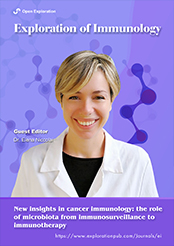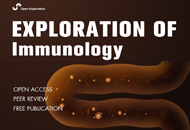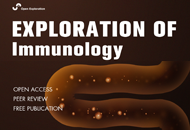-
 Special Issue Topic
Special Issue TopicNew Insights in Cancer Immunology: the Role of Microbiota from Immunosurveillance to Immunotherapy
Submission Deadline: June 20, 2022Guest Editor
Dr. Elena Niccolai E-Mail
Department of Experimental and Clinical Medicine, University of Florence, Italy
Research Keywords: Microbiota, immunity, immunotherapy
About the Special Issue
Cancer is a complicated disease whose prognosis is largely determined by tumor cell-microenvironment cross-talk. As now widely known, the interactions between tumor and immune cells are crucial in the pathogenesis of cancer, and understanding them is essential for the development of new cancer therapeutic approaches. Moreover, additional host genetic characteristics, environmental stress, lifestyle, and gut microbiome may all influence the immune contexture and consequently the tumour progression. As widely described today, the microbiome affects cancer initiation and progression through direct effects on the tumor cells or indirectly through manipulation of the immune system. Indeed, microbiota affect cancer cell antigenicity and adjuvanticity, determining whether an antigen triggers an immune response and if its nature drives the acquisition of a specific T cell phenotype (effector or regulator). In addition, microbiota can elicit the production of cytokines (and other immune mediators) by influencing the immunostimulatory or immunosuppressive reactions. The microbes interact with the host and the tumor in different and context-specific manner, conferring individual and tumor-specificities to the immunomodulatory phenotype observed. Elucidation of the mechanisms through which microbiota cancer and immune cells interact can help devise targeted and personalized tools for cancer diagnosis, therapy and prevention.
In this Special Issue, we welcome original articles, reviews, case reports, preclinical and clinical studies. On this topic, of particular interests are: studies that characterize the cancer microbiome immune axis, with a focus on microbial inflammation and microbiota anti-tumor immunity modulation, during cancer initiation, progression and treatment; studies on the role of microbial metabolites and other mediators in modulating cancer–immune interaction; studies on the effect of microbiota composition on immunotherapy’s efficacy and on the prediction of patients' response (predictive biomarkers); preclinical and clinical studies on the effects of microbiota modulation (probiotics, prebiotics, FMT, etc.) in cancer.
Keywords: Tumor microenvironment, tumor immunology, immune checkpoint blockade, immunotherapy, immune evasion, T regulatory cells, microbiome, metabolites, NGS, trascriptomics
Call for Papers
Published Articles
 Utilization of formalin-fixed paraffin-embedded specimens for microbiota characterization in cancer: utility and concernOpen AccessPerspectiveMicrobiome research has enormous potential in cancer research and the use of formalin-fixed paraffin-embedded (FFPE) tissues could offer many advantages. The tumor microenvironment represents a suit [...] Read more.Leandro Di Gloria, Elena NiccolaiPublished: October 31, 2022 Explor Immunol. 2022;2:723–730
Utilization of formalin-fixed paraffin-embedded specimens for microbiota characterization in cancer: utility and concernOpen AccessPerspectiveMicrobiome research has enormous potential in cancer research and the use of formalin-fixed paraffin-embedded (FFPE) tissues could offer many advantages. The tumor microenvironment represents a suit [...] Read more.Leandro Di Gloria, Elena NiccolaiPublished: October 31, 2022 Explor Immunol. 2022;2:723–730
DOI: https://doi.org/10.37349/ei.2022.00078 The human microbiome and the tumor microenvironmentOpen AccessPerspectiveThe human microbiome has emerged as an intriguing field of scientific research. Its role in human physiology impacts both health and disease, contributing to the enhancement or impairment of metabol [...] Read more.Joseph F. MurphyPublished: August 29, 2022 Explor Immunol. 2022;2:581–588
The human microbiome and the tumor microenvironmentOpen AccessPerspectiveThe human microbiome has emerged as an intriguing field of scientific research. Its role in human physiology impacts both health and disease, contributing to the enhancement or impairment of metabol [...] Read more.Joseph F. MurphyPublished: August 29, 2022 Explor Immunol. 2022;2:581–588
DOI: https://doi.org/10.37349/ei.2022.00069 -
-
Ongoing Special Issues
-
Completed Special Issues